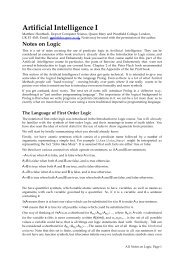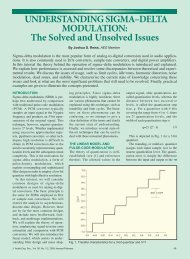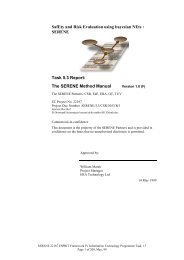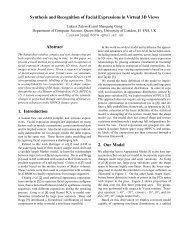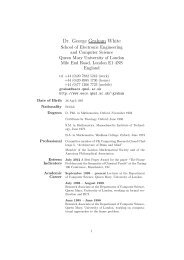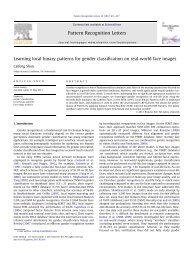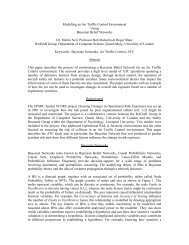IEEE TRANS. AFFECTIVE COMPUTING 14 [17] J. A. Healey and R. W. Picard, “Detecting stress during realworld driving tasks <strong>using</strong> physiological sensors,” IEEE Trans. Intell. Transp. Syst., vol. 6, no. 2, pp. 156–166, 2005. [18] P. Lang, M. Bradley, and B. Cuthbert, “International affective picture system (IAPS): Affective ratings of pictures and instruction manual,” University of Florida, USA, Tech. Rep. A-8, 2008. [19] Z. Zeng, M. Pantic, G. I. Roisman, and T. S. Huang, “A survey of affect recognition methods: Audio, visual, and spontaneous expressions,” IEEE Trans. Pattern Anal. Mach. Intell., vol. 31, no. 1, pp. 39–58, Mar. 2009. [20] P. Lang, M. Greenwald, M. Bradely, and A. Hamm, “Looking at pictures - affective, facial, visceral, and behavioral reactions,” Psychophysiology, vol. 30, no. 3, pp. 261–273, May 1993. [21] J.KimandE.André,“<strong>Emotion</strong>recognitionbasedonphysiological changes in music listening,” IEEETrans.Pattern Anal. Mach. Intell., vol. 30, no. 12, pp. 2067–2083, 2008. [22] J. Wang and Y. Gong, “Recognition of multiple drivers’ emotional state,” in Proc. Int. Conf. Pattern Recognition, 2008, pp. 1 –4. [23] C. L. Lisetti and F. Nasoz, “Using noninvasive wearable computers to recognize human emotions from physiological signals,” EURASIP J. Appl. Signal Process., vol. 2004, no. 1, pp. 1672–1687, Jan. 2004. [24] G. Chanel, J. Kierkels, M. Soleymani, and T. Pun, “Short-term emotion assessment in a recall paradigm,” International Journal of Human-Computer Studies, vol. 67, no. 8, pp. 607–627, Aug. 2009. [25] J. Kierkels, M. Soleymani, and T. Pun, “Queries and tags in affectbased multimedia retrieval,” in Proc. Int. Conf. Multimedia and Expo, Special Session on Implicit Tagging, New York, USA,Jun.2009, pp. 1436 – 1439. [26] M. Soleymani, G. Chanel, J. J. M. Kierkels, and T. Pun, “Affective characterization of movie scenes based on content analysis and physiological changes,” International Journal of Semantic Computing, vol. 3, no. 2, pp. 235–254, Jun. 2009. [27] A.Yazdani, J.-S.Lee,andT.Ebrahimi,“Implicit emotional tagging of multimedia <strong>using</strong> EEG signals and brain computer interface,” in Proc. SIGMM Workshop on Social media, 2009, pp. 81–88. [28] P. Ekman, W. Friesen, M. Osullivan, A. Chan, I. Diacoyannitarlatzis, K. Heider, R. Krause, W. Lecompte, T. Pitcairn, P. Riccibitti, K. Scherer, M. Tomita, and A. Tzavaras, “Universals and culturaldifferences in the judgments of facial expressions of emotion,” Journal of Personality and Social Psychology, vol. 53, no. 4, pp. 712– 717, Oct. 1987. [29] A. Hanjalic and L.-Q. Xu, “Affective video content representation and modeling,” IEEE Trans. Multimedia, vol. 7, no. 1, pp. 143–154, 2005. [30] H. L. Wang and L.-F. Cheong, “Affective understanding in film,” IEEE Trans. Circuits Syst. Video Technol., vol. 16, no. 6, pp. 689 – 704, Jun. 2006. [31] M. Soleymani, J. Kierkels, G. Chanel, and T. Pun, “A Bayesian framework <strong>for</strong> video affective representation,” in Proc. Int. Conf. Affective Computing and Intelligent interaction, Sep. 2009, pp. 1–7. [32] D. Liu, “Automatic mood detection from acoustic music data,” in Proc. Int. Conf. Music In<strong>for</strong>mation Retrieval, 2003, pp. 13–17. [33] L. Lu, D. Liu, and H.-J. Zhang, “Automatic mood detection and tracking of music audio signals,” IEEE Transactions on Audio, Speech and Language Processing, vol. 14, no. 1, pp. 5–18, Jan. 2006. [34] Y.-H. Yang and H. H. Chen, “Music emotion ranking,” in Proc. Int. Conf. Acoustics, Speech and Signal Processing, ser. ICASSP ’09, Washington, DC, USA, 2009, pp. 1657–1660. [35] S. Koelstra, A. Yazdani, M. Soleymani, C. Mühl, J.-S. Lee, A. Nijholt, T. Pun, T. Ebrahimi, and I. Patras, “Single trial classification of EEG and peripheral physiological signals <strong>for</strong> recognition of emotions induced by music videos,” in Brain In<strong>for</strong>matics, ser. Lecture Notes in Computer Science, Y. Yao, R. Sun, T. Poggio, J. Liu, N. Zhong, and J. Huang, Eds. Berlin, Heidelberg: Springer Berlin / Heidelberg, 2010, vol. 6334, ch. 9, pp. 89–100. [36] M. E. Tipping, “Sparse bayesian learning and the relevance vector machine,” Journal of Machine Learning Research, vol. 1, pp. 211–244, Jun. 2001. [37] J. D. Morris, “SAM: the self-assessment manikin. An efficient cross-cultural measurement of emotional response,” Journal of Advertising Research, vol. 35, no. 8, pp. 63–68, 1995. [38] M. Bradley and P. Lang, “International affective digitized sounds (iads): Stimuli, instruction manual and affective ratings,” The Center <strong>for</strong> Research in Psychophysiology, University of Florida, Gainesville, Florida, US, Tech. Rep. B-2, 1999. [39] Lazar, N., “Combining Brains: A Survey of Methods <strong>for</strong> Statistical Pooling of In<strong>for</strong>mation,” NeuroImage, vol. 16, no. 2, pp. 538–550, June 2002. [40] T. M. Loughin, “A systematic comparison of methods <strong>for</strong> combining p-values from independent tests,” Computational Statistics & Data <strong>Analysis</strong>, vol. 47, pp. 467–485, 2004. [41] R. J. Barry, A. R. Clarke, S. J. Johnstone, C. A. Magee, and J. A. Rushby, “EEG differences between eyes-closed and eyes-open resting conditions,” Clinical Neurophysiology, vol. 118, no. 12, pp. 2765–2773, Dec. 2007. [42] R. J. Barry, A. R. Clarke, S. J. Johnstone, and C. R. Brown, “EEG differences in children betweeneyes-closed and eyes-open resting conditions,” Clinical Neurophysiology, vol. 120, no. 10, pp. 1806– 1811, Oct. 2009. [43] W. Klimesch, P. Sauseng, and S. Hanslmayr, “EEG alpha oscillations: the inhibition-timing hypothesis.” Brain Research Reviews, vol. 53, no. 1, pp. 63–88, Jan. 2007. [44] H. Cole and W. J. Ray, “EEG correlates of emotional tasks related to attentional demands,” International Journal of Psychophysiology, vol. 3, no. 1, pp. 33–41, Jul. 1985. [45] J. Onton andS. Makeig, “High-frequency broadbandmodulations of electroencephalographic spectra,” Frontiers in Human Neuroscience, vol. 3, 2009. [46] I. Goncharova, D. J. McFarland, J. R. Vaughan, and J. R. Wolpaw, “EMG contamination of EEG: spectral and topographical characteristics,” Clinical Neurophysiology, vol. 114, no. 9, pp. 1580–1593, Sep. 2003. [47] E. Harmon-Jones, “Clarifying the emotive functions of asymmetrical frontal cortical activity,” Psychophysiology, vol. 40, no. 6, pp. 838–848, 2003. [48] R. R. Cornelius, The Science of <strong>Emotion</strong>. Research and Tradition in the Psychology of <strong>Emotion</strong>. Upper Saddle River, NJ: Prentice-Hall, 1996. [49] D. Sander, D. Grandjean, and K. R. Scherer, “A systems approach to appraisal mechanisms in emotion,” Neural Networks, vol. 18, no. 4, pp. 317–352, 2005. [50] R. McCraty, M. Atkinson, W. Tiller, G. Rein, and A. Watkins, “The effects of emotions on short-term power spectrum analysis of heart rate variability,” The American Journal of Cardiology, vol. 76, no. 14, pp. 1089 – 1093, 1995. [51] S. D. Kreibig, “Autonomic nervous system activity in emotion: A review,” Biological Psychology, vol. 84, no. 3, pp. 394–421, 2010. [52] G.Chanel,J.J.M.Kierkels, M.Soleymani,andT.Pun,“Short-term emotion assessment in a recall paradigm,” International Journal of Human-Computer Studies, vol. 67, no. 8, pp. 607–627, Aug. 2009. [53] J.KimandE.André,“<strong>Emotion</strong>recognition basedonphysiological changes in music listening,” IEEETrans.Pattern Anal. Mach. Intell., vol. 30, no. 12, pp. 2067–2083, 2008. [54] P. Rainville, A. Bechara, N. Naqvi, and A. R. Damasio, “Basic emotionsare associated with distinctpatternsof cardiorespiratory activity.” International Journal of Psychophysiology, vol.61, no. 1, pp. 5–18, Jul. 2006. [55] P. Kelm, S. Schmiedeke, and T. Sikora, “Feature-based video key frame extraction <strong>for</strong> low quality video sequences,” in Proc. Int. Workshop on Image <strong>Analysis</strong> <strong>for</strong> Multimedia Interactive Services, May 2009, pp. 25 –28. [56] Z. Rasheed, Y. Sheikh, and M. Shah, “On the use of computable features <strong>for</strong> film classification,” IEEE Trans. Circuits Syst. Video Technol., vol. 15, no. 1, pp. 52–64, 2005. [57] P. Valdez and A. Mehrabian, “Effects of color on emotions.” J. Exp. Psychol. Gen., vol. 123, no. 4, pp. 394–409, Dec. 1994. [58] R. W. Picard, Affective Computing. MIT Press, Sep. 1997. [59] D. Li, I. K. Sethi, N. Dimitrova, and T. McGee, “Classification of general audio data <strong>for</strong> content-based retrieval,” Pattern Recogn. Lett., vol. 22, no. 5, pp. 533–544, 2001. [60] L. Lu, H. Jiang, and H. Zhang, “A robust audio classification and segmentation method,” in Proc. ACM Int. Conf. Multimedia, Ottawa, Canada, 2001, pp. 203–211. [61] P. Boersma, “Praat, a system <strong>for</strong> doing phonetics by computer,” Glot International, vol. 5, no. 9/10, pp. 341–345, 2001. [62] L. Chen, S. Gunduz, and M. Ozsu, “Mixed type audio classification with support vector machine,” in Proc. Int. Conf. Multimedia and Expo, Toronto, Canada, Jul. 2006, pp. 781 –784. [63] J.-S. Lee and C. H. Park, “Robust audio-visual speech recognition based on late integration,” IEEE Trans. Multimedia, vol. 10, no. 5, pp. 767–779, 2008.
IEEE TRANS. AFFECTIVE COMPUTING 15 Sander Koelstra (S’09) received the B.Sc. and M.Sc. degrees in Computer Science from the Delft University of Technology, The Netherlands, in 2006 and 2008, respectively. He is currently a PhD student with the School of Electronic Engineering and Computer Science at Queen Mary University of London. His research interests lie in the areas of brain-computer interaction, computer vision and pattern recognition. Christian Mühl is a PhD researcher at the Human-Media Interaction group of the University of Twente, The Netherlands. After receiving a M.Sc. Cognitive Science at the University of Osnabrueck, Germany, in 2007, working on neurophysiological mechanisms of cross-modal attention, he focuses now on the identification of affective states by neurophysiological signals in various induction contexts. Especially, he is interested in the differential effects of auditory and visual affective stimulation on the activity of the brain as measured via electroencephalography. Mohammad Soleymani (S’05) received both his B.Sc. and M. Sc. from department of Electrical and Computer Engineering, University of Tehran, in 2003 and 2006. He is now a doctoral student and research assistant at the Computer Vision and Multimedia Laboratory (CVML), Computer Science Department, University of Geneva. His research interests include: affective computing, and multimedia in<strong>for</strong>mation retrieval. He has been co-organizing the MediaEval multimedia benchmarking initiative since 2010. Jong-Seok Lee (M’06) received his Ph.D. degree in electrical engineering and computer science in 2006 from KAIST, Daejeon, Korea, where he worked as a postdoctoral researcher and an adjunct professor. He is now working as a research scientist in the Multimedia Signal Processing Group at Swiss Federal Institute of Technology in Lausanne (EPFL), Lausanne, Switzerland. His current research interests include audio-visual signal processing, multimedia quality assessment and multimodal humancomputer interaction. He is (co-)author of more than 50 publications. Ashkan Yazdani received his M.Sc. in electrical engineering from University of Tehran, Iran in 2007. From 2006 to 2007, he worked as research assistant in the Brain Signal Processing Group at University of Tehran, on the topics of EEG-based person identification, braincomputer interfacing and fMRI signal processing. He is currently a PhD candidate at the Multimedia Signal Processing Group, Swiss Federal Institute of Technology in Lausanne (EPFL), Lausanne, Switzerland. His main research interests include EEG-based brain-computer interface systems and biomedical signal processing. Touradj Ebrahimi (M’92) received his M.Sc. and Ph.D., both in electrical engineering, from the Swiss Federal Institute of Technology in Lausanne (EPFL), Lausanne, Switzerland, in 1989 and 1992, respectively. From 1989 to 1992, he was a research assistant at the Signal Processing Laboratory of EPFL. In 1990, he was a visiting researcher at the Signal and Image Processing Institute of the University of Southern Cali<strong>for</strong>nia, Los Angeles, Cali<strong>for</strong>nia. In 1993, he was a research engineer at the Corporate Research Laboratories of Sony Corporation in Tokyo. In 1994, he served as a research consultant at AT&T Bell Laboratories. He is currently a Professor heading Multimedia Signal Processing Group at EPFL, where he is involved with various aspects of digital video and multimedia applications. He is (co-)author of over 100 papers and holds 10 patents. Thierry Pun (IEEE Member, EE Eng. 1979, PhD 1982) is head of the Computer Vision and Multimedia Laboratory, Computer Science Department, University of Geneva, Switzerland. He received his Ph.D. in image processing <strong>for</strong> the development of a visual prosthesis <strong>for</strong> the blind in 1982, at the Swiss Federal Institute of Technology, Lausanne, Switzerland. He was visiting fellow from 1982 to 1985 at the National Institutes of Health, Bethesda, USA. After being CERN Fellow from 1985 to 1986 in Geneva, Switzerland, he joined the University of Geneva, in 1986, where he currently is full professor at the Computer Science Department. He has authored or co-authored about 300 full papers as well as eight patents. His current research interests, related to affective computing and multimodal interaction, concern: physiological signals analysis <strong>for</strong> emotion assessment and brain-computer interaction, multimodal interfaces <strong>for</strong> blind users, data hiding, multimedia in<strong>for</strong>mation retrieval systems. and workshops. Anton Nijholt is full professor of Human Media Interaction at the University of Twente (NL). His main research interests are multimodal interaction, brain-computer interfacing, virtual humans, affective computing, and entertainment computing. He has co-organized many conferences (e.g., IVA 2009 and ACII 2009) and satellite workshops (e.g., on affective brain-computer interfacing) and has been guest-editor of many journals <strong>for</strong> special issues devoted to selections of updates of papers from these conferences Ioannis (Yiannis) Patras (S’97, M’02, SM’11) received the the Ph.D. degree from the Department of Electrical Engineering, Delft University of Technology, The Netherlands, in 2001. He is a Senior Lecturer in Computer Vision in the School of Electronic Engineering and Computer Science in the Queen Mary, University of London. He is/has been in the organizing committee of IEEE SMC 2004, Face and Gesture Recognition 2008, ICMR2011, ACM Multimedia 2013 and was the general chair of WIAMIS 2009. He is associate editor in the Image and Vision Computing Journal. His research interests lie in the areas of Computer Vision and Pattern Recognition, with emphasis on Human Sensing and its applications in Multimedia Retrieval and Multimodal Human Computer Interaction. Currently, he is interested in Brain Computer Interfaces and the analysis of facial and body gestures.



